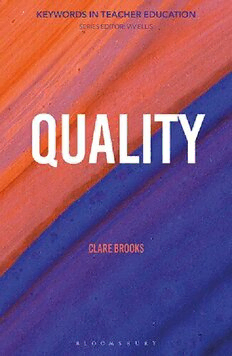
Quality: Keywords in Teacher Education PDF
129 Pages·2023·1.507 MB·English
Most books are stored in the elastic cloud where traffic is expensive. For this reason, we have a limit on daily download.
Preview Quality: Keywords in Teacher Education
Description:
Discussions of quality dominate the field of teacher education. However, definitions of quality can vary enormously and are often vague and imprecise, relying on proxies for quality which make inaccurate assumptions about what matters in the education of teachers. This book explores different ways in which quality can be defined and understood within teacher education, offering a way of categorizing and understanding why some quality indicators miss the mark. The book introduces the idea of a quality conundrum, with illustrative examples from international ITE practice, to show how different conceptions of quality in ITE can have good intentions but be potentially damaging to its overall transformative potential. It also provides examples of where practice has been able to move beyond restrictive definitions of quality to enact a more transformative vision of teacher education. This analysis ties the use of quality indicators to historical developments in teacher education and political shifts in how it is viewed, the role education is perceived to play in society, and considers where the power lies in locating who decides what counts as quality in teacher education (and also who and what gets excluded). Key topics covered include:· the use of standards, accreditation and inspection frameworks;· the range of input, process, output and perspectival indicators used to judge quality in ITE;· the different discourses of teacher quality which influence the pedagogy and structure of teacher education programmes.The author also gives particular attention to how to address different approaches to quality when they start to reach conundrum proportions, and how to redress teacher education towards what matters rather than what counts.
See more
The list of books you might like
Most books are stored in the elastic cloud where traffic is expensive. For this reason, we have a limit on daily download.
